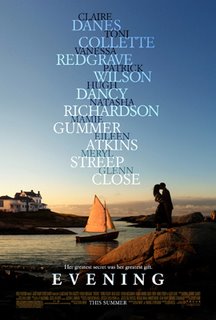
It takes a special kind of talent to take a seemingly sure-fire premise and a wonderful cast that
Evening holds, and then completely rob it of every ounce of life and passion. Not since last year's ill-fated remake of
All the King's Men have I seen such a large and wonderful cast of talent be wasted on so little.
Evening so desperately wants to be a movie that moves us completely, but seems to struggle in mustering up even the slightest of emotions from its audience. Scene after dreary scene plays out on the screen, and the audience is just left adrift, looking for something to cling onto. Cinematographer turned director Lajos Koltai paints a pretty picture, but the hollowness behind it all turns the movie into an interminable bore to sit through.
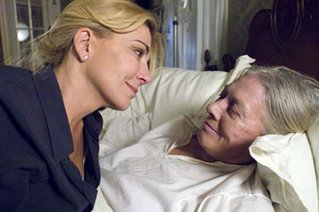
As elderly mother Ann Grant Lord (Vanessa Redgrave) lies on her deathbed, she can't help but think back on the life she led and the man who got away when she was a young and carefree woman who aspired to be a singer. Her two adult daughters (Toni Collette and Natasha Richardson) are at her side as Ann thinks back to the time she found love for only one day. We witness in flashbacks the younger Ann (Claire Danes) as she arrives at the home of her best friend Lila (Mamie Gummer) for Lila's impending wedding ceremony. She reunites with Lila's alcoholic brother, Buddy (Hugh Dancy), whom she has always had a close relationship with. But while staying at the home, her eyes happen to fall upon a handsome young medical doctor named Harris Arden (Patrick Wilson). The two seem to instantly be drawn to one another and before long, they're sneaking off to be alone, naming stars in the sky after each other, and sharing their innermost emotions with one another. The love was not to be, however, and as the older Ann prepares to leave this world, she wonders if perhaps she made a mistake on the path life has led her up to this point.
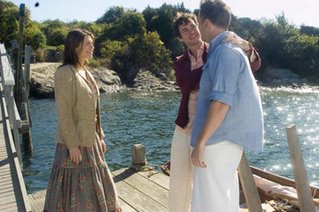
If one were to only look at the surface of
Evening, it would be understandable if you were fooled into thinking this was a good movie. It has a strong visual look, with some absolutely beautiful shots and scenic views. And just reading the cast list alone is enough to make any film fan drool. The cast includes such sure-fire talent as Vanessa Redgrave, Claire Danes, Meryl Streep, Glenn Close, Toni Collette, and Patrick Wilson - all of whom have all impressed me greatly in many past roles. But here, they are cast aside by a meandering screenplay that never really goes anywhere. In bringing the novel to the big screen, original author Susan Minot along with co-writer Michael Cunningham seem like they were lost in trying to bring the book's ideas to the script. The movie is severely fragmented, with neither of the two plots (the one in the present day, and the one in the past) truly joining together to form a complete whole. The film's editing is awful, with the movie jumping back and forth between both time periods without any rhyme or reason. Sometimes, the movie jumps to the next scene and a completely different point of time before the current scene we're watching seems to be finished. It doesn't help matters that the movie throws in some "fantasy" scenes as the elderly Ann hallucinates in her near-death state. Everything is so jumbled and incoherent, it becomes a chore to follow along.
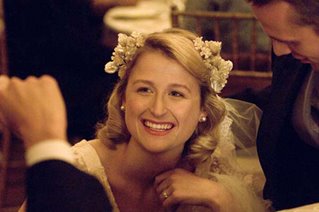
Perhaps the greatest offense that
Evening pulls on its audience is that it's a tear jerker that will be hard pressed to jerk a single tear from even the most sensitive audience member. The movie is far too emotionally distant and hollow to get even the slightest response. The supposed love affair that the younger Ann and this Harris Arden guy had for a brief period comes across as a joke, because we never learn just why they are so attracted to each other, or why their love is so strong after knowing each other for less than a day. Harris comes across as having the personality of a hunk of wood, and never once gets to display anything resembling a personality. The two share no real chemistry during their scenes together, and everything seems to happen because the movie wants it to, not because of the relationship building out of the characters. Heck, I had an easier time believing the friendship that grew between a young wannabe chef and a rat in the animated
Ratatouille than I did believing Ann and Harris were in love here. The fact that the relationship never grows to anything remotely convincing obviously all but buries the film, since it is supposed to be what drives everything. We find ourselves wondering why the elderly Ann still looks back at it so fondly some 50 to 60 years later, since there's nothing on the screen to convince us otherwise. Because we don't believe in the love at the center of the story, everything else falls apart.
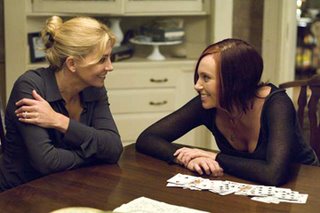
There's nothing more infuriating than seeing good talent wasted on bad material, and aside from a few stand out performances, everyone seems to have been shafted by this unworthy screenplay. Vanessa Redgrave and Claire Danes are both very good as Ann in the two main stages of her life that the film covers. Danes, especially, who initially comes across so charming and likeable when we first see her, it's a shame that the movie never makes her more interesting than just being a pretty face. Relative newcomer Mamie Gummer is beautiful and sympathetic as Ann's best friend, Lila, who on the eve of her wedding is starting to have second thoughts about her choice. She is actually the daughter of Meryl Streep (who happens to play the older version of Lila late in the film), and seems well on the way to living up to her famous mother's acting legacy. Most of the rest of the cast are either uninteresting or may as well have just stayed home. Both Meryl Streep and Glenn Close are restricted to mere cameos that barely have time to register. As Ann's adult daughters during the present day scenes, Toni Collette and Natasha Richardson never truly grew on me. They're not bad, exactly, it's simply that the film never gives them enough to do. As the two main men in Ann's life during the flashbacks, Patrick Wilson is a handsome bore with no personality, while Hugh Dancy gets to stumble around a lot and slur his words as Lila's boozing brother who has always had a secret thing for Ann. The emotionally distant screenplay prevents anyone from creating a genuine character, so everyone comes across as hollow shells always looking for something to do.
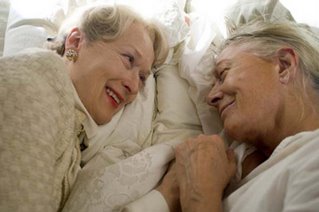
You can obviously tell that the people who made
Evening did a pretty good job in fooling themselves into thinking they were making a worthwhile film. It looks great, the cast is game, and it just has this certain air of self-importance to the entire production. And yet, nothing in this movie convinced me that it was worth everything it received. The whole thing is just so mediocre and unmemorable, you start to wonder what everyone could have possibly seen in it. There must have been something about this story that made so much talent believe in it at one time. Whatever that something was, it's not up there on the screen.
Evening tries so hard to touch our hearts that you almost want to give it points for trying. It's too bad the movie had to turn out so dry and utterly emotionless.
0 comments
 It takes a special kind of talent to take a seemingly sure-fire premise and a wonderful cast that Evening holds, and then completely rob it of every ounce of life and passion. Not since last year's ill-fated remake of All the King's Men have I seen such a large and wonderful cast of talent be wasted on so little. Evening so desperately wants to be a movie that moves us completely, but seems to struggle in mustering up even the slightest of emotions from its audience. Scene after dreary scene plays out on the screen, and the audience is just left adrift, looking for something to cling onto. Cinematographer turned director Lajos Koltai paints a pretty picture, but the hollowness behind it all turns the movie into an interminable bore to sit through.
It takes a special kind of talent to take a seemingly sure-fire premise and a wonderful cast that Evening holds, and then completely rob it of every ounce of life and passion. Not since last year's ill-fated remake of All the King's Men have I seen such a large and wonderful cast of talent be wasted on so little. Evening so desperately wants to be a movie that moves us completely, but seems to struggle in mustering up even the slightest of emotions from its audience. Scene after dreary scene plays out on the screen, and the audience is just left adrift, looking for something to cling onto. Cinematographer turned director Lajos Koltai paints a pretty picture, but the hollowness behind it all turns the movie into an interminable bore to sit through. As elderly mother Ann Grant Lord (Vanessa Redgrave) lies on her deathbed, she can't help but think back on the life she led and the man who got away when she was a young and carefree woman who aspired to be a singer. Her two adult daughters (Toni Collette and Natasha Richardson) are at her side as Ann thinks back to the time she found love for only one day. We witness in flashbacks the younger Ann (Claire Danes) as she arrives at the home of her best friend Lila (Mamie Gummer) for Lila's impending wedding ceremony. She reunites with Lila's alcoholic brother, Buddy (Hugh Dancy), whom she has always had a close relationship with. But while staying at the home, her eyes happen to fall upon a handsome young medical doctor named Harris Arden (Patrick Wilson). The two seem to instantly be drawn to one another and before long, they're sneaking off to be alone, naming stars in the sky after each other, and sharing their innermost emotions with one another. The love was not to be, however, and as the older Ann prepares to leave this world, she wonders if perhaps she made a mistake on the path life has led her up to this point.
As elderly mother Ann Grant Lord (Vanessa Redgrave) lies on her deathbed, she can't help but think back on the life she led and the man who got away when she was a young and carefree woman who aspired to be a singer. Her two adult daughters (Toni Collette and Natasha Richardson) are at her side as Ann thinks back to the time she found love for only one day. We witness in flashbacks the younger Ann (Claire Danes) as she arrives at the home of her best friend Lila (Mamie Gummer) for Lila's impending wedding ceremony. She reunites with Lila's alcoholic brother, Buddy (Hugh Dancy), whom she has always had a close relationship with. But while staying at the home, her eyes happen to fall upon a handsome young medical doctor named Harris Arden (Patrick Wilson). The two seem to instantly be drawn to one another and before long, they're sneaking off to be alone, naming stars in the sky after each other, and sharing their innermost emotions with one another. The love was not to be, however, and as the older Ann prepares to leave this world, she wonders if perhaps she made a mistake on the path life has led her up to this point. If one were to only look at the surface of Evening, it would be understandable if you were fooled into thinking this was a good movie. It has a strong visual look, with some absolutely beautiful shots and scenic views. And just reading the cast list alone is enough to make any film fan drool. The cast includes such sure-fire talent as Vanessa Redgrave, Claire Danes, Meryl Streep, Glenn Close, Toni Collette, and Patrick Wilson - all of whom have all impressed me greatly in many past roles. But here, they are cast aside by a meandering screenplay that never really goes anywhere. In bringing the novel to the big screen, original author Susan Minot along with co-writer Michael Cunningham seem like they were lost in trying to bring the book's ideas to the script. The movie is severely fragmented, with neither of the two plots (the one in the present day, and the one in the past) truly joining together to form a complete whole. The film's editing is awful, with the movie jumping back and forth between both time periods without any rhyme or reason. Sometimes, the movie jumps to the next scene and a completely different point of time before the current scene we're watching seems to be finished. It doesn't help matters that the movie throws in some "fantasy" scenes as the elderly Ann hallucinates in her near-death state. Everything is so jumbled and incoherent, it becomes a chore to follow along.
If one were to only look at the surface of Evening, it would be understandable if you were fooled into thinking this was a good movie. It has a strong visual look, with some absolutely beautiful shots and scenic views. And just reading the cast list alone is enough to make any film fan drool. The cast includes such sure-fire talent as Vanessa Redgrave, Claire Danes, Meryl Streep, Glenn Close, Toni Collette, and Patrick Wilson - all of whom have all impressed me greatly in many past roles. But here, they are cast aside by a meandering screenplay that never really goes anywhere. In bringing the novel to the big screen, original author Susan Minot along with co-writer Michael Cunningham seem like they were lost in trying to bring the book's ideas to the script. The movie is severely fragmented, with neither of the two plots (the one in the present day, and the one in the past) truly joining together to form a complete whole. The film's editing is awful, with the movie jumping back and forth between both time periods without any rhyme or reason. Sometimes, the movie jumps to the next scene and a completely different point of time before the current scene we're watching seems to be finished. It doesn't help matters that the movie throws in some "fantasy" scenes as the elderly Ann hallucinates in her near-death state. Everything is so jumbled and incoherent, it becomes a chore to follow along. Perhaps the greatest offense that Evening pulls on its audience is that it's a tear jerker that will be hard pressed to jerk a single tear from even the most sensitive audience member. The movie is far too emotionally distant and hollow to get even the slightest response. The supposed love affair that the younger Ann and this Harris Arden guy had for a brief period comes across as a joke, because we never learn just why they are so attracted to each other, or why their love is so strong after knowing each other for less than a day. Harris comes across as having the personality of a hunk of wood, and never once gets to display anything resembling a personality. The two share no real chemistry during their scenes together, and everything seems to happen because the movie wants it to, not because of the relationship building out of the characters. Heck, I had an easier time believing the friendship that grew between a young wannabe chef and a rat in the animated Ratatouille than I did believing Ann and Harris were in love here. The fact that the relationship never grows to anything remotely convincing obviously all but buries the film, since it is supposed to be what drives everything. We find ourselves wondering why the elderly Ann still looks back at it so fondly some 50 to 60 years later, since there's nothing on the screen to convince us otherwise. Because we don't believe in the love at the center of the story, everything else falls apart.
Perhaps the greatest offense that Evening pulls on its audience is that it's a tear jerker that will be hard pressed to jerk a single tear from even the most sensitive audience member. The movie is far too emotionally distant and hollow to get even the slightest response. The supposed love affair that the younger Ann and this Harris Arden guy had for a brief period comes across as a joke, because we never learn just why they are so attracted to each other, or why their love is so strong after knowing each other for less than a day. Harris comes across as having the personality of a hunk of wood, and never once gets to display anything resembling a personality. The two share no real chemistry during their scenes together, and everything seems to happen because the movie wants it to, not because of the relationship building out of the characters. Heck, I had an easier time believing the friendship that grew between a young wannabe chef and a rat in the animated Ratatouille than I did believing Ann and Harris were in love here. The fact that the relationship never grows to anything remotely convincing obviously all but buries the film, since it is supposed to be what drives everything. We find ourselves wondering why the elderly Ann still looks back at it so fondly some 50 to 60 years later, since there's nothing on the screen to convince us otherwise. Because we don't believe in the love at the center of the story, everything else falls apart. There's nothing more infuriating than seeing good talent wasted on bad material, and aside from a few stand out performances, everyone seems to have been shafted by this unworthy screenplay. Vanessa Redgrave and Claire Danes are both very good as Ann in the two main stages of her life that the film covers. Danes, especially, who initially comes across so charming and likeable when we first see her, it's a shame that the movie never makes her more interesting than just being a pretty face. Relative newcomer Mamie Gummer is beautiful and sympathetic as Ann's best friend, Lila, who on the eve of her wedding is starting to have second thoughts about her choice. She is actually the daughter of Meryl Streep (who happens to play the older version of Lila late in the film), and seems well on the way to living up to her famous mother's acting legacy. Most of the rest of the cast are either uninteresting or may as well have just stayed home. Both Meryl Streep and Glenn Close are restricted to mere cameos that barely have time to register. As Ann's adult daughters during the present day scenes, Toni Collette and Natasha Richardson never truly grew on me. They're not bad, exactly, it's simply that the film never gives them enough to do. As the two main men in Ann's life during the flashbacks, Patrick Wilson is a handsome bore with no personality, while Hugh Dancy gets to stumble around a lot and slur his words as Lila's boozing brother who has always had a secret thing for Ann. The emotionally distant screenplay prevents anyone from creating a genuine character, so everyone comes across as hollow shells always looking for something to do.
There's nothing more infuriating than seeing good talent wasted on bad material, and aside from a few stand out performances, everyone seems to have been shafted by this unworthy screenplay. Vanessa Redgrave and Claire Danes are both very good as Ann in the two main stages of her life that the film covers. Danes, especially, who initially comes across so charming and likeable when we first see her, it's a shame that the movie never makes her more interesting than just being a pretty face. Relative newcomer Mamie Gummer is beautiful and sympathetic as Ann's best friend, Lila, who on the eve of her wedding is starting to have second thoughts about her choice. She is actually the daughter of Meryl Streep (who happens to play the older version of Lila late in the film), and seems well on the way to living up to her famous mother's acting legacy. Most of the rest of the cast are either uninteresting or may as well have just stayed home. Both Meryl Streep and Glenn Close are restricted to mere cameos that barely have time to register. As Ann's adult daughters during the present day scenes, Toni Collette and Natasha Richardson never truly grew on me. They're not bad, exactly, it's simply that the film never gives them enough to do. As the two main men in Ann's life during the flashbacks, Patrick Wilson is a handsome bore with no personality, while Hugh Dancy gets to stumble around a lot and slur his words as Lila's boozing brother who has always had a secret thing for Ann. The emotionally distant screenplay prevents anyone from creating a genuine character, so everyone comes across as hollow shells always looking for something to do. You can obviously tell that the people who made Evening did a pretty good job in fooling themselves into thinking they were making a worthwhile film. It looks great, the cast is game, and it just has this certain air of self-importance to the entire production. And yet, nothing in this movie convinced me that it was worth everything it received. The whole thing is just so mediocre and unmemorable, you start to wonder what everyone could have possibly seen in it. There must have been something about this story that made so much talent believe in it at one time. Whatever that something was, it's not up there on the screen. Evening tries so hard to touch our hearts that you almost want to give it points for trying. It's too bad the movie had to turn out so dry and utterly emotionless.
You can obviously tell that the people who made Evening did a pretty good job in fooling themselves into thinking they were making a worthwhile film. It looks great, the cast is game, and it just has this certain air of self-importance to the entire production. And yet, nothing in this movie convinced me that it was worth everything it received. The whole thing is just so mediocre and unmemorable, you start to wonder what everyone could have possibly seen in it. There must have been something about this story that made so much talent believe in it at one time. Whatever that something was, it's not up there on the screen. Evening tries so hard to touch our hearts that you almost want to give it points for trying. It's too bad the movie had to turn out so dry and utterly emotionless.






0 Comments:
Post a Comment
<< Home